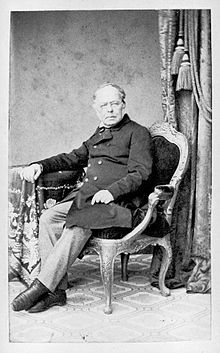- Moritz Hauptmann
-
Moritz Hauptmann (October 13, 1792 – January 3, 1868), was a German music theorist, teacher and composer.
Hauptmann was born in Dresden, and studied violin under Scholz, piano under Franz Lanska, composition under Grosse and Francesco Morlacchi, (the rival of Carl Maria von Weber). He completed his education as a violinist and composer under Louis Spohr, and until 1821 held various appointments in private families. In addition, he studied mathematics and acoustics.
Hauptmann was initially employed as an architect before finding success as a musician. Notable in his early musical output is a grand tragic opera, Mathilde. He joined the orchestra of Kassel in 1822 under Spohr's direction. There, he first taught composition and music theory. His pupils included Ferdinand David, Friedrich Burgmüller, Friedrich Kiel and others.
In 1842, Hauptmann became Kantor of the Thomanerchor at the Thomaskirche in Leipzig (a post made famous by Johann Sebastian Bach) as well as professor of music theory at the newly-founded conservatoire at the invitation of Felix Mendelssohn. In this capacity, his unique gift as a teacher developed and it was readily acknowledged by his enthusiastic and quite-often distinguished pupils.
Hauptmann's compositions are marked by symmetry and craftsmanship rather than spontaneous invention. His vocal output include two masses, choral songs for mixed voices (Op. 32, 47) and numerous part songs. He was a founding member and editor of Bach Gesellschaft edition of the compete works of Bach, where he edited the first two volumes of church cantatas and the Lutheran Masses.
His musical philosophy embodied in his book Die Natur der Harmonik und Metrik (The Nature of Harmony and Meter, 1853), in which he attempted a philosophic explanation of musical form. His theory is described as "Hegelen" and he emphasized concepts of unity, opposition, and reunion, which he finds in chords, scales, key relationships, and meter. He conceived of minor and major triads as opposite. This theory influenced "harmonic dualists" including Hugo Riemann. He also advocated just intonation and considered enharmonic progressions unnatural. In this sense, he could be considered a conservative in relation to the compositional trends of his time. He displayed a taste for classical proportion, formal order, metrical clarity, and tonal logic. Unlike the Romantic trends of continuous legato, he considered any "metrical first" (ie. downbeat - implied or actual) to be automatically accented.
Hauptmann's Pupils
- Friedrich Baumfelder
- Hans von Bülow
- Ferdinand David
- Friedrich Kiel
- Otto Goldschmidt
- Salomon Jadassohn
- Carl Friedrich Weitzmann
- Joseph Joachim
- William Mason
- Arthur Sullivan
- Arnold Wehner
Bibliography
- Hauptmann, Moritz: The Letters of a Leipzig Cantor (2 vols.). London: Novello, Ewer and Co., 1892 [1]
- Hauptmann, Moritz: The nature of harmony and metre. New York: Da Capo Press, 1991, Reprint of the ed. London, Sonnenschein, 1893. ISBN 0-306-76298-6. [2]
- Jorgenson, Dale A. Moritz Hauptmann of Leipzig. Studies in History and Interpretation of Music, Vol. 2. Lewiston, NY: The Edwin Mellen Press, 1986.
- Mason, William. Memories of a Musical Life. New York: The Century Company, 1902. [3]
 This article incorporates text from a publication now in the public domain: Chisholm, Hugh, ed (1911). Encyclopædia Britannica (11th ed.). Cambridge University Press.
This article incorporates text from a publication now in the public domain: Chisholm, Hugh, ed (1911). Encyclopædia Britannica (11th ed.). Cambridge University Press.External links
Categories:- 1792 births
- 1868 deaths
- People from Dresden
- Honorary Members of the Royal Philharmonic Society
- Thomaskantors
- German composers
- German music theorists
- Felix Mendelssohn College of Music and Theatre faculty
Wikimedia Foundation. 2010.

